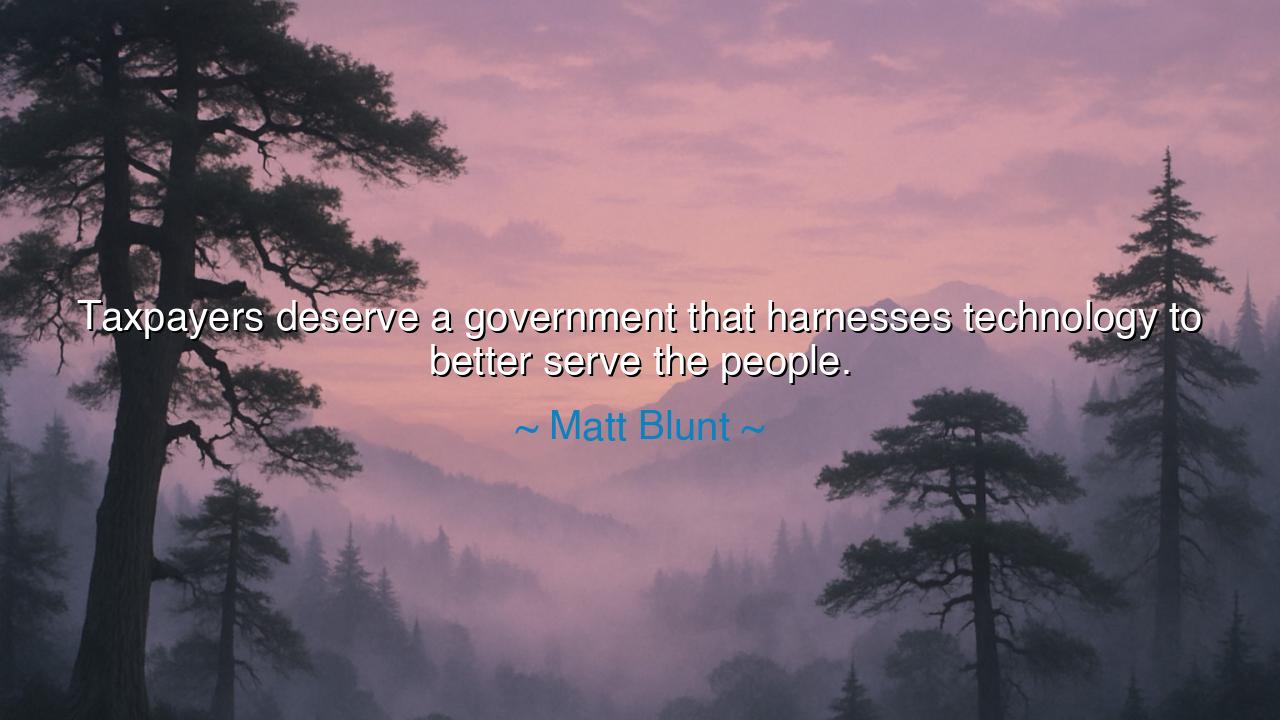
Taxpayers deserve a government that harnesses technology to






The words of Matt Blunt carry the force of both duty and vision: “Taxpayers deserve a government that harnesses technology to better serve the people.” In this single utterance, there is both an ancient echo and a modern summons. The ancients spoke of kings as shepherds, whose task was not dominion but service to their flocks. In this age, where power is not measured by armies but by technology, the shepherd’s crook is no longer carved of wood but forged in circuits and networks. To govern rightly is to use these tools, not for the glory of rulers, but for the well-being of the governed.
The word deserve is not lightly spoken. It proclaims that the people, whose labor fills the coffers of the state, are owed not neglect but service, not delay but efficiency, not secrecy but clarity. Just as a craftsman must use his sharpest chisel to honor the stone he works upon, so must a government use its most advanced tools to honor the trust of its citizens. Anything less is betrayal, for to collect the coin of the taxpayer without returning the blessing of wise governance is to reap without sowing.
The meaning of harnessing technology is more than building machines or maintaining databases. It is the art of bending the power of invention toward justice, toward transparency, toward the easing of burdens that weigh upon the shoulders of the common man. Think of the Egyptian scribes, who with their invention of papyrus transformed the way kingdoms were administered. What once depended on fading memory or carved stone was now written swiftly, shared widely, and preserved across centuries. In like manner, the technologies of our day — the internet, digital record-keeping, artificial intelligence — are scrolls of fire that can illuminate governance if wielded with wisdom.
History offers a clear story. In the early twentieth century, as the United States expanded, government was slow, tangled in paper and bureaucracy. But when Social Security was introduced in the 1930s, the government had to find ways to process millions of records — an impossible task without embracing technology. Punch-card machines, primitive though they were, became the backbone of the program, ensuring that elders and the vulnerable were cared for. Without this step of harnessing innovation, the promise of the program would have collapsed under its own weight. Here, technology became not an ornament, but a lifeline of justice.
The wisdom here is not confined to rulers. It calls to every leader, every worker, every steward of responsibility. Whether one governs a household, a business, or a nation, the principle remains: use the finest tools available to serve, not to dominate. Technology is a double-edged sword — it can oppress with surveillance or liberate with transparency; it can waste the people’s time in broken systems or free them through speed and clarity. The heart of governance is found not in possessing power but in wielding it with compassion.
Thus the lesson is plain. To the leaders of this age: invest in systems that make the lives of citizens lighter, not heavier. To the common worker: demand that your labor, given in taxes, be honored by a government that is as efficient and modern as the tools of private industry. To all people: remember that progress is not merely measured by wealth or might, but by how well the weakest among us are served.
Practical action must follow. Citizens should learn of the tools their government uses, and press for reforms where technology lags. Leaders should look to innovation not as a luxury but as a sacred duty. And each person, in their own sphere, should ask: Am I using the best of what is available to serve others? For service is the highest law, and technology, rightly used, is its faithful servant.
Let this teaching endure: taxpayers deserve no less than a government that embraces the light of innovation. To deny them this is to dim the flame of democracy itself. But to grant it, to harness the lightning of invention for the common good, is to build a society where the rulers are true servants, and the people walk in dignity and strength. This is the covenant of our age, as it was in ages past: that all power must bend to service, and all service must uplift the people.






AAdministratorAdministrator
Welcome, honored guests. Please leave a comment, we will respond soon